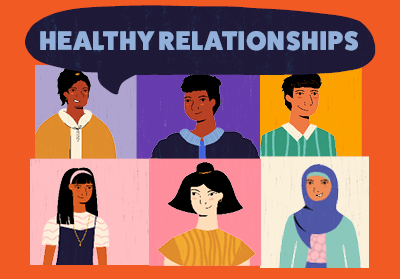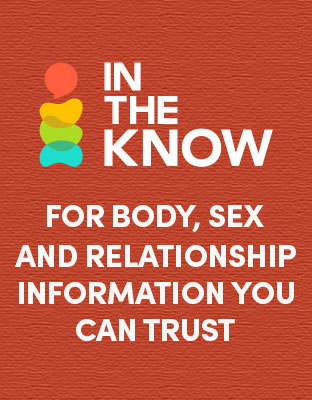Young people have the right to make decisions about their health. This includes decisions about relationships and sex.
On this page you will find information about:
- relationships
- consent
- talking about sex
- being ready to have sex
- STIs and how to stay safe from them
- sexual assault
Relationships+

Relationships are how we connect with others. They are an important part of every person's life.
There are many different types of relationships that people might have in their life. These can be:
-
family
people that you are related to you. This might be your mum, dad, brother, sister or cousins. All families are different.
-
friends
people who you are emotionally close to and who you can talk to and share experiences with. Friendships can take a lot of work and should be equal and positive.
-
school or work relationships
people you might be friendly with at work or school but might not be as close as a friend. Sometimes relationships at school and work can turn into friendships.
-
intimate relationships (romantic partners)
an intimate relationship is a special relationship. It is a relationship you have if you really like someone and they feel the same way.
Intimate relationships can be between people who are dating, 'hooking-up' or are married.
You might like people of the opposite sex, the same sex, or both sexes. This is okay. No one should feel ashamed of their feelings or the type of relationship they want to have. Whoever you choose to have an intimate relationship with is up to you.
For more information about types of relationships and dating (including talking to your parents and your rights), download:
Consent+
Consent is when one person gives permission to another person to do something. This means both people know what is about to happen.
It also means knowing they have the option to say ‘no’ or change their mind later on. You and your partner should feel safe every step of the way.
You need consent to:
- kiss
- hug
- touch your partner on the genitals, breasts or anus
- have oral sex
- have vaginal sex
- have anal sex
If someone is asleep, unconscious or drunk/on drugs they cannot consent.
Both people always need to give consent to any sexual activity. You can ask for consent by saying:
- are you feeling alright?
- do you want to do this?
- do you want to stop?
In NSW, the age of consent to sexual activity is 16 years old. This means it is against the law for a person to have sex with a person under the age of 16. However, we know that some young people will choose to have sex before they are 16. If someone is under the age of 16 they still have the right to access sexual health services and support.
Watch the video below to learn more about consent: What is Consent?
For more information about consent, go to: Body Talk – Relationships and Consent
For more information on age, consent and the law, call: Family Planning Australia Talkline on 1300 658 886
download: The Low Down
Talking about sex+
Good communication is important in relationships, especially when you are thinking about having sex.
Being honest about feeling nervous, unsure, comfortable or enjoyment is okay. Your partner might even feel the same way.
Some things you can say to start the conversation about sex and relationships are:
- I would like to take it slowly
- I want to make sure I am ready
- I am nervous about this
- Are you OK with this?
- Is this something you want to do?
For more information about types of relationships and dating (including talking to your parents, and your health rights), download our Relationships 101 resource.
Being ready for sex+

Spending time with your partner can be fun and exciting. You might want to show your partner that you care for them.
There are a lot of ways that you can show someone that you care. This can be kissing, touching, or having sex.
There are lots of different kinds of sex that people can have. Sex can involve genitals (penis and vagina), the anus, fingers, and the mouth.
It's up to you to decide what type of kissing, touching or sex you are ready for.
This is OK as long as it is something you both want to do.
To learn more about different types of sex, go to: Body Talk - Sex
There is a lot to think about before you have sex for the first time. You might be wondering how you will know when you are ready to have sex.
Some signs that you might be ready to have sex are:
- you feel comfortable to have sex with your partner
- you do not feel pressured to have sex with your partner
- having sex is something you want to do
- you are comfortable talking to your partner about practising safe sex
For more information about whether you are ready for sex and what to think about before having sex for the first time, download: The Low Down
What are STIs and how to stay safe from them?+
An important part of having sex is knowing about sexually transmissible infections and how to stay safe from them.
A sexually transmissible infection is also called an STI.
An STI is an infection that can be passed from one person to another person during unprotected sex.
Unprotected sex is sex without a condom, or when the condom breaks or slips off. To learn more about the different STIs, go to: Body Talk – STIs
To stay safe from STIs, you should learn how to use condoms correctly and have regular sexual health checks.
To learn more about using condoms, go to: Body Talk – Safe sex
A sexual health check is an appointment with a doctor or nurse where you can:
- have a test to check for STIs
- get treatment for STIs
- talk about your health
- talk about contraception
- talk about relationships
Sexual health checks are confidential, this means everything you talk about is private between you and your doctor or nurse.
All young people have the right to access sexual health checks and support.
To learn more about what happens in a sexual health check, go to: Body Talk – Sexual health checks
To find out where you can get free condoms in NSW, go to: Freedom condom
You can also buy condoms at places like:
- supermarkets
- chemists
- petrol stations
Sexual assault+
Sex without consent is sexual assault and is against the law.
There are people you can talk to if you have been sexually assaulted. If you have been sexually assaulted and are in immediate danger, call 000. You can also go to a local hospital if you need medical care.
For advice about sexual assault for yourself, friends, family or support people, call: NSW Sexual Violence Helpline - 1800 424 017 (24 hours)
You can also find more information from NSW Sexual Assault Services. Click here to find the sexual assault service closest to you.
Full Stop Australia provides free 24/7 telephone and online counselling for anyone who has been impacted by violence or abuse.
To speak to a counsellor at Full Stop Australia, call: 1800 385 578
You can also call Kids Helpline on: 1800 551 800 (24 hours).
There is also free telephone interpreting service. Just let the counsellor know if you need an interpreter. You can also use the Telephone Interpreter Service (TIS) by calling: 131 450
If a young person has been accused of a crime after having sex, they should seek legal advice. They can get support from Shopfront or Youth Law Australia.
For more information+
Download Relationships 101 (English) booklet for information about relationships for young people from culturally and linguistically diverse backgrounds.
Download The Low Down booklet for information about sexual health and relationships for young people.
You can also call the Family Planning Australia Talkline on 1300 658 886 to speak to a nurse, or click here to talk to one of our nurses online.
To speak to someone in your language, call the TIS on 131 450 and ask to be connected to Family Planning Australia Talkline on 1300 658 886.




